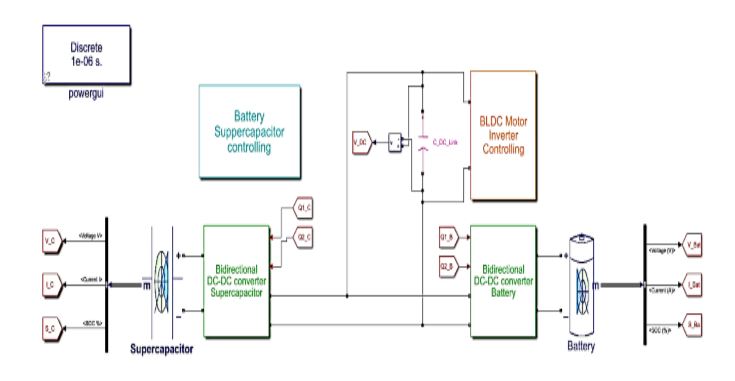Battery and Super Capacitor Fed BLDC Motor Drive for Electrical Vehicle Applications
Objective
Main objective of this project is to feasibility and capability of a hybrid energy storage system (HESS), composed of battery and super-capacitor units, through simulation.
Abstract
This paper examines the feasibility and capability of a hybrid energy storage system (HESS), composed of battery and super-capacitor units, through simulation. Extensive use of internal combustion engine (ICE) - based vehicles has contributed to severe adverse impacts on the environment and accelerated depletion of fossil fuel reserves, leading to considerable rise in price of gas over the past two decades.
These challenges, plus the low efficiency associated with the conventional drivetrains, have made the automotive industry seriously consider and move towards drivetrain electrification in vehicular systems.
In electrified vehicles, the propulsion is fully or partially provided by electric motors, powered by on board energy storage systems. In an attempt to make up for the limitations of the existing energy storage devices and contribute to vehicle electrification movement, The choice of HESS topology has been made based on simplicity of power and control circuits, cost and performance. The design takes into consideration the required power, the converter losses, limitations of energy storage devices, and quality of the current drawn from battery cells.
Keywords: Super capacitor, Power Converter, Brushless DC Motor, battery.
NOTE: Without the concern of our team, please don't submit to the college. This Abstract varies based on student requirements.
Block Diagram

Specifications
Software Configuration:
Operating System : Windows 7/8/10
Application Software : Matlab/Simulink
Hardware Configuration:
RAM : 8 GB
Processor : I3 / I5(Mostly prefer)
Learning Outcomes
- Introduction to Matlab/Simulink
- What is EISPACK & LINPACK
- How to start with MATLAB
- About Matlab language
- About tools & libraries
- Application of Matlab/Simulink
- About Matlab desktop
- Features of Matlab/Simulink
- Basics on Matlab/Simulink
- Introduction to Matlab/Simulink software
- Introduction to power electronics converters
- Design of batteries
- Design of super capacitors
- Design of three phase inverter
- Design of BLDC motor
- We can learn about the generation of gate pulses to the converter
- We can learn about the bidirectional DC -DC converter operation
- Project Development Skills:
- Problem analyzing skills
- Problem solving skills
- Creativity and imaginary skills
- Programming skills
- Deployment
- Testing skills
- Debugging skills
- Project presentation skills
- Thesis writing skills


 Paper Publishing
Paper Publishing
